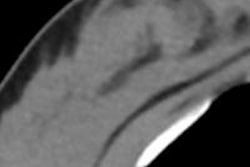
Online searches have become a major source of public health information, used by researchers to track hot topics such as the spread of infectious disease. But analyzing Internet searches could also help monitor patient knowledge and anxiety about noninfectious diseases such as breast cancer, according to a new study.
Using Google Trends, researchers from the University of Michigan discovered that peaks in Internet search volume for the term "dense breast" seemed to correlate with legislative actions and news coverage related to the topic of increased cancer risk from dense breasts. States in which a breast density notification law had been passed, had been denied, or was currently being considered had the highest search volumes (Academic Radiology, July 7, 2014).
"This suggests that any legislative activity, whether proposing a bill or even defeat of a bill, and associated news coverage in these states appear to correspond with trends in increased information seeking about dense breasts, thus suggesting that legislation may be a potential driver," wrote a group led by Dr. Soudabeh Dehkordy.
 Dr. Soudabeh Dehkordy from the University of Michigan.
Dr. Soudabeh Dehkordy from the University of Michigan.The researchers set out to track patterns of "information-seeking behavior" -- i.e., Web searches -- regarding the subject of dense breasts and to examine any correlation with the passage or introduction of dense-breast notification legislation. Their hypothesis was that one of the potential consequences of legislation and the attendant publicity is anxiety among women undergoing screening mammography, leading to more Web searches.
"This study was our first foray into how information aggregators like Google Trends might help us understand women's health trends," Dehkordy told AuntMinnie.com. "We decided to use the issue of breast cancer and dense breast notification to explore it."
A pressing issue
Mammography's limitations in women with dense breast tissue have become a pressing issue in recent years. Since Connecticut passed the first dense breast notification law in 2009, 19 states have followed suit. But how does the conversation about dense tissue and cancer -- as well as news of notification legislation -- affect women?
"Our goal for the study was to introduce radiologists to alternative data sources, beyond the traditional randomized controlled trial," co-author Dr. Ruth Carlos told AuntMinnie.com. "Many of the questions we'd like to answer about the focus on breast density and how that affects women don't lend themselves to [a randomized controlled trial] design."
Dehkordy and colleagues began by entering the term "dense breast" into the Google Trends tool. They mapped the dates of legislative actions for dense breast notification that received widespread coverage in the lay media to information-seeking trends about dense breasts over time. They interpreted bumps in Web searches for "dense breast" as a marker for anxiety that women might be feeling about dense tissue and cancer.
"With this increased focus on the dense breast as a risk factor for breast cancer -- and, therefore, the call for more intensive screening -- we wondered what women's reactions were," Carlos said. "There is an association between dense breast tissue and increased cancer risk, but it's important to remember that there are lots of women with dense breasts who never get the disease. We wanted to investigate whether the legislation was having an unintended impact on women by increasing their anxiety about breast cancer."
Though the study results showed a correlation between Internet searches for "dense breast" and related legislation or newsworthy events, the findings don't necessarily reflect cause and effect. Nonetheless, tracking information-seeking behavior could help health organizations, advocacy groups, and health professionals develop appropriate educational content and approaches, according to Dehkordy and colleagues.
"Although trends in data are useful, information-seeking behavior cannot be directly attributed to legislative action or newsworthy events," they concluded. "Despite these limitations, providing readily accessible and accurate online resources of information about breast density and educating women about efficient Internet searching techniques can optimize the seeking, managing, and using [of] the information."




















